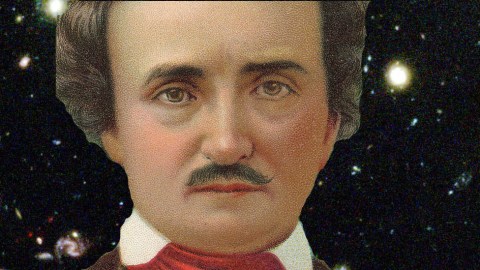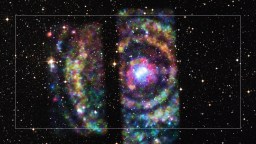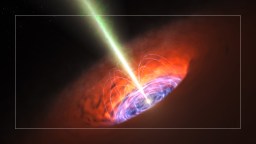Edgar Allan Poe, poet, essayist… cosmologist?

Image source: Hulton Archive / Getty Images / BigThink
- In 1848, Edgar Allan Poe wrote a book outlining his theory of everything.
- Modern readers will find many familiar concepts, including the Big Bang and multiple universes.
- While it has little real scientific merit, it does have a solution to Olbers’ Paradox.
Edgar Allan Poe is one of the best-known American authors. His poems and short stories are known and loved all over the world. That he was the inventor of the detective story is less well known. Even less well known is his prediction of modern cosmology in a little book he titled Eureka.
Poe’s Theory of Everything
In 1848, Poe gave a lecture titled “On the Cosmography of the Universe” to a crowd of 60 somewhat confused listeners. This lecture formed the basis of what would become Eureka: A Prose Poem; an obscure little masterpiece that had a run of a mere 50 copies.
Essentially a metaphysical work, Poe lays out a vision of a Newtonian universe that uses very different assumptions than those which were common when he was writing. While most physicists at the time presumed the universe was static, infinite, and eternal, Poe instead argued that God created a “primordial particle” which divided into all the matter we see today and then expanded from its initial position to spread across space. More than a few people have noticed the similarities of this idea to the Big Bang theory.
He doesn’t stop there. He then suggests that gravity, to him the attractive force caused by the primordial oneness of everything, will cause the universe to collapse upon itself into another primordial particle; which is reminiscent of the Big Crunch. He even muses that this could be part of an endless cycle of expansion and contraction, which today we call the oscillating model.
In other sections, he touches on the idea that “space and duration are one” which some see as a prediction of relativistic “space-time” and muses on the interchangeability of matter and energy. Toward the end, he suggests that our universe could be one of many that exists on an infinite plane — one of the earliest references to other universes.
In another section, he devises the first working solution to Olbers’ Paradox; the problem of why the sky gets dark at night if the universe is infinitely old, vast and evenly populated with stars.
The paradox is that if those three things were true, which many astronomers thought they were, then the night sky should be very bright. No matter what direction in the sky you look at, you should be looking at a star which has had eternity to shine down on Earth.
Poe was the first to solve the paradox by suggesting that the observable universe is finite in size and that the light from stars beyond the furthest point we can observe just hasn’t gotten here yet. Astronomer Edward R. “Ted” Harrison explained in his book Darkness at Night that this is the first plausible solution and that Eurkea anticipated similar arguments put forth by Lord Kelvin in 1901.
So, is it a towering work of science?
No, far from it. Most critical analysis concludes that his work has no scientific merit for several reasons.
Poe makes assertions where are factually inaccurate, not the least of which is his claim that Kepler arrived at his laws of planetary motion by guesswork rather than by analyzing the data recorded by Tycho Brahe. He spends a great deal of time satirizing both empirical and deductive methods of rigorously looking for truth and as a result is less than rigorous and convincing when he tries to address potential objections.
His work is also purely Newtonian and does not fully anticipate relativistic theory as shown when he calls his work “geometrical” and proposes that there is pre-existing space that the material universe expands into, which modern physics rejects. Because of issues like these, Eureka is fundamentally metaphysical or even mystic in nature and reads more like a pre-Socratic attempt to explain the cosmos than a scientific work. Empedocles‘ ideas on the cosmos come to mind while reading it.
However, his predictions are uncanny and show a non-casual relationship with modern science. The astronomer Alberto Cappi ascribes this to his assumption of an evolving universe, which most of his contemporaries, and even later thinkers like Albert Einstein, rejected. Cappi concludes, however, that with the advance of astronomy past what Poe had to work with, all that is left is a metaphysical work that anticipates some relativistic notions while remaining an outdated Newtonian model. He summarizes this by saying:
“Eureka is not a crank nor a scientific theory. It offers us a fascinating vision of the Universe by an imaginative mind, which using the science of its time could conceive of the most revolutionary cosmology of the 19th century.”
Most interestingly though, Dr. Cappi explains that Alexander Friedmann, the scientist who first proposed that Einstein’s theories implied that the universe was expanding, was an avid fan of Poe. While it can never be known if he read Eureka, it is fun to imagine that Poe influenced a physicist who would so radically shake our view of how the universe works.
It is worth noting that Poe’s solution to Olbers’ Paradox is commonly referenced and he is often given credit for his solution.
Is this the only time this has ever happened? Are there any other cases of somebody doing this?
“Prediscoveries,” defined by author Tom Siegfried as “instances of theoretical anticipation,” are relatively common in science. The physicist James Clerk Maxwell argued that invisible forms of radiation must exist and was proven right nine years after his death when radio waves were discovered.
The philosopher Immanuel Kant was one of the first to declare that heavenly bodies such as Andromeda were “Island Universes” and not nebulae inside our galaxy, that idea wouldn’t be confirmed until the middle of the 20th century. Democritus is often credited as the father of modern atomic theory for his writings on the subject around 400 BCE.
Poe’s work, however, is only admired for his take on Oblers’ paradox. Dr. Cappi ascribes this lack of love to the metaphysical nature of the work, its often seemingly arbitrary assumptions, its limited printing, and the fact that a poet’s argument for an expanding universe would have been dead on arrival in 1848.
Should Edgar Allan Poe be included in the lists of great cosmologists? Probably not, but Eureka is a curious pre-relativistic model of a consistent, expanding cosmos all the same. It is worth reading both for its own merits as a “prose poem” and as the blueprint for a strange universe not so different from our own.





